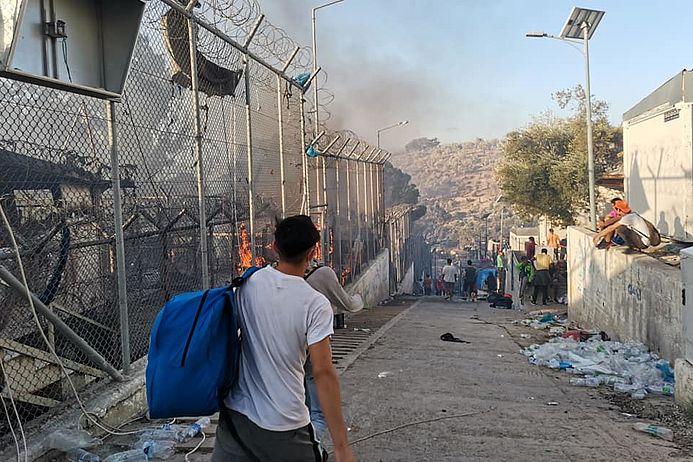“Instead of wasting resources and people on guarding borders, we should be concentrating all our efforts on fighting the virus inside our borders,” said World Medical Association Chairperson Frank Ulrich Montgomery in March 2020. And yet, politicians continue to see the source of the coronavirus threat as coming first and foremost from outside and others, whilst securing access to vaccines for their own populations. Regardless of where the epicentre of the pandemic is, the argument of wanting to stop the spread of the virus is being used to justify far-reaching measures to exclude migrants and refugees. Not only is their mobility, which is often of vital importance to them, being hugely restricted, they are also often defenceless against the virus on their routes and at their destinations. This holds true for harsh quarantine measures with no regard for their well-being at refugee shelters in Germany as well as for the lockdowns for people in the so-called hotspots on the Greek EU external border, which have been repeatedly extended for months now and have just been stepped up once again. Even though the speed and thoroughness these measures are now being implemented with are breath-taking - the fact that all this can now take place without much in the way of resistance or protest has been prepared by the anti-refugee and anti-solidarity policy the EU has adopted in recent years.
18 March 2020, in the midst of the Corona crisis, marked four years since the EU-Turkey agreement and its hotspot system entered into force. For over four years now, the EU has been making sure that thousands of people arriving on the Greek islands via Turkey are forced to live in dramatic conditions in completely overcrowded refugee camps. For over four years now, arrivals’ access to asylum procedures that are enshrined in law has been exacerbated. For over four years now, human rights activists have been sounding the alarm over a deterioration of the situation, and for over four years now it has indeed been deteriorating. The price of having thousands of refugees stranded on the Greek islands and years of Turkey having prevented and still continuing to prevent many more people from travelling onwards to Europe is high, not just in financial terms. It has also meant the EU gradually eroding the human rights that underpin it.
A fire, a signal
The fact that it has done next to nothing to help people in the totally overcrowded hotspots on Chios, Kos, Lesbos, Leros and Samos to enable them to protect themselves effectively against the corona pandemic merely attests to this further. In spite of this, for months an outbreak of COVID-19 at the refugee camps on the Greek islands was prevented, not least thanks to the preventive work by refugee self-help organisations. But once tourists and other privileged travellers were allowed back onto the islands at the end of May, the risk that the virus would soon reach the camps rose, even though people there, in contrast to the rest of the population, continued to face considerable restrictions to their mobility. In August, the time had come: there was a coronavirus outbreak at the Vial refugee camp on Chios, but which was soon contained. In early September, though, several people in Moria on Lesbos, the largest camp on the Greek islands, tested positive. People at the camp started protesting about the accommodation and basic services and the non-existent measures to protect them against the coronavirus. Shortly afterwards, fires broke out and the camp was burnt to the ground. Within the space of a few days the Greek government set up a new camp, but the people from Moria only went there reluctantly or at the behest of the police, because they were worried that it would be a closed camp. And that a bad makeshift solution would turn into an even worse permanent situation. Just as they had already experienced at Moria.
Hotspots like the Moria refugee camp were set up in response to the displacement of many Syrians in 2015, which some have dubbed a “refugee crisis”. The ideas being that people would quickly undergo an asylum procedure here and then be assigned to other EU countries or sent back to Turkey. Apart from the fact that this plan did not work and people often end up stranded at these hotspots for months or even years, fast-track procedures like this are unacceptable in terms of human rights, as they often mean there is no thorough examination of the individual case. Removal to Turkey, where refugee protection is not guaranteed and the danger of chain deportation to countries of origin continues to be a threat is equally unacceptable. In spite of these serious deficiencies, the EU now evidently wants to build on the EU-Turkey agreement for the reform of the common European asylum system which is set to be initiated under the German EU Council Presidency in the second half of the year: based on this agreement, there are to be “deepened partnerships with important countries of origin and transit.” Furthermore, every asylum application is to be preceded by a prior assessment, whose thoroughness and compatibility with the rule of law is dubious, given everything we know about the hotspots. If people come from a country with a low application acceptance rate, they are supposed to undergo a fast-track procedure. The Commission is not ruling out the possibility that both the people undergoing the fast-track procedure and those undergoing the normal procedures may be detained in closed camps until a decision on admission or deportation or until they agree to “voluntary” return. All pretty much exactly as already tested in Moria and the other hotspots in recent years at the expense of human rights. Recently, even the controversial plans to establish closed camps have been slowly but surely taking shape here in the form of repeatedly extended lockdowns in response to the corona pandemic.
Migration management, migration pushback
Deals with countries of origin and transit to stop refugees and migrants are nothing new. In principle, this is exactly what the EU has done in the past with some African countries, for example by paying development aid to get them to cooperate in “migration management”, that is to say in preventing refugees and migration to Europe. North African countries like Egypt or Libya, in particular, which is where refugees from Africa attempt or have attempted to make the crossing to Europe, are beneficiaries of payments from Europe. Although torture has been proven to take place in these countries, the EU invests in the security apparatuses there if this means refugees and migrants being prevented from continuing on to Europe.
These deals with the EU are not confined to the countries they are concluded with but they actually trigger chain reactions. In the wake of the deal with the EU, Turkish president Erdoğan is not only able to wage war against the Kurds, but also prevented more refugees from entering the country by building a border fortification on the Syrian border, for instance. This has led to the situation in Idlib, Syria intensifying dramatically: the refugee camps there are completely overcrowded, hospitals have been destroyed, basic needs are not able to be met, and a border crossing point for UN aid was closed at the end of July due to the obstructionist stance adopted by China and Russia on the UN Security Council. Under these circumstances, the people there have no chance of preparing effectively to deal with the corona pandemic.
So with the EU-Turkey deal, Europe has not just abdicated its responsibility for the refugees in Turkey, but also for those seeking protection in war-ravaged Syria. This long-standing policy of “out of sight, out of mind” was the breeding ground for the racist rioting that followed Erdoğan’s unilateral opening of the border to the EU in February 2020. After thousands of refugees subsequently gathered in the Evros region in the north-west of Turkey and arrivals on the Greek islands then increased, violent racists felt called upon to take border control into their own hands.
From Maraş in the south of Turkey, to the Greek islands, to the Evros and beyond, self-proclaimed “civil defence forces” have bandied together to international applause to uninhibitedly attack refugees. Helpers and journalists have also been threatened and injured. Instead of turning against those responsible - those bombing Idlib, making deals with despots and turning the Greek islands into open-air prisons - the anger was targeted at the weakest and their supporters.
Human rights – on and off
No police and no constitutional state are rushing to protect the victims, on the contrary. All too often, refugees become victims of both non-state and state violence. The endangerment of refugee boats and the use of tear gas on adults and children have long since been part of the standard border control measures. For some months now, the Greek coast guard has even been actively putting refugees back out to sea on unmaneuverable inflatables in the Aegean Sea. Even after they have already reached Greek soil. The fact that the Greek government - without any objection from Brussels - then suspended the right of asylum for a month, as if human rights could be switched on and off at will in a state founded on the rule of law, was a further vindication for the right-wing mob: pogrom-like violence results in the desired policy measures. Starting with the EU-Turkey deal in contempt of human rights, this leads to disastrous chain reactions in all directions: from the wall construction on the Turkish-Syrian border to the exclusion and suspension of the rights of refugees in the very midst of EU countries.
Much of this happened before the World Health Organization declared the spread of the coronavirus a pandemic. The next chain reaction followed shortly after: on the very day the German Chancellor called on the population to come together in solidarity, the Federal Government stopped taking in refugees on humanitarian grounds, once again demarcating the lethal limits of solidarity. Whilst in this country the population cautioned each other to stay at home and wash their hands several times a day, millions of refugees worldwide were enduring and are still enduring disastrous hygienic conditions in the closest of quarters in miserable permanently makeshift accommodation. Thousands of them at the EU’s external borders, where the situation has deteriorated dramatically in recent weeks.
In spite of all of this, the other EU countries cannot bring themselves to accept at least a small number of especially vulnerable people from Greek refugee camps. Germany, the richest country in Europe, recently promised to take in 1,553 refugees from Greece - mostly families with children - and to provide emergency humanitarian aid on the ground. The fact that even this minimum of humanity towards the weakest among those seeking refuge is virtually impossible to enforce shows that vulnerability must not become the sole benchmark for accepting refugees and that charity must not take the place of law and justice. In times like these, in particular, it is crucial that we do not sacrifice our work for the rights of migrants and refugees in exchange for minimal humanitarian concessions. The blatant violations of refugees’ rights must not be allowed to pale in the shadow of the corona pandemic.
In the age of coronavirus in particular, what a coalition of European human rights organisations, including medico international, has said about protecting migrants and refugees from violence at the borders is more important than ever: “Migrants and refugees are not a threat to the EU it has to protect itself from. They are the ones actually threatened by state violence on their dangerous journey. We use the instrument of human rights to protect them from the brutality directed towards them." It is this instrument that now needs to be defended - from those who refuse to protect the human rights of refugees on racist and nationalist grounds, as well as from those who think minimal humanitarian gestures are enough to replace legal entitlements. If there is one thing the coronavirus should teach us, it is this: we live in an inextricably linked world and we cannot protect ourselves or abdicate responsibility for each other through isolationism.
Published in German in September 2020.
Translated by Mamisoa Rajosvah.

Ramona Lenz
Ramona Lenz is a specialist on refugees and migration at medico international.


